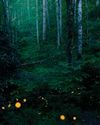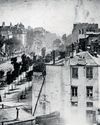
However good your technique and camera equipment, it can be hard to find new angles and approaches with landscape photography. A lot of the most picturesque places in the world have been photographed to death, and even if you rise at silly o’clock for amazing light, or are lucky enough to get highly photogenic weather, chances are that another photographer somewhere has bagged a similar shot.
So it’s not surprising that a lot of conventional landscape photographers have branched out, exploring more novel techniques such as shooting stills and video with drones, or light painting. Liam Man, who won the ultra-competitive Open Landscape Category in the most recent Sony World Photography Awards, combines both approaches, so we caught up to find out more.
A keen experimenter
As Liam, who is still only in his 20s, explains, he was always drawn to the natural world. ‘Growing up watching every David Attenborough wildlife documentary, I spent my days imagining myself as an intrepid explorer, always on the lookout for cool wildlife and interesting viewpoints,’ he recalls. ‘Luckily for me, my secondary school’s art department had a small point-and-shoot camera and after some gentle persuading, I was allowed to borrow it. I immediately caught the photography bug and the camera probably spent more time at my house than at school. I could finally show people the sights that fascinated me versus telling people.’
While experimenting with the school’s now seldom-seen compact, Liam became fascinated by the macro mode. ‘It felt like black magic, capturing detail that I couldn’t make out with my naked eye. To me, cameras went from a tool that simply duplicated what I saw, to a means of seeing past my perception and capturing the essence of a moment. I became obsessed with long exposures, macro, water drop flash photography and light painting. Since then I’ve dabbled in every genre.’
Denne historien er fra September 03, 2024-utgaven av Amateur Photographer.
Start din 7-dagers gratis prøveperiode på Magzter GOLD for å få tilgang til tusenvis av utvalgte premiumhistorier og 9000+ magasiner og aviser.
Allerede abonnent ? Logg på
Denne historien er fra September 03, 2024-utgaven av Amateur Photographer.
Start din 7-dagers gratis prøveperiode på Magzter GOLD for å få tilgang til tusenvis av utvalgte premiumhistorier og 9000+ magasiner og aviser.
Allerede abonnent? Logg på

Major OM System launch incoming
AT THE beginning of January, OM System announced that a new camera was coming this year, along with compact, splash- and dust-proof lenses.

Urth Variable ND641990 Filter Plus+
Angela Nicholson takes a close look at a high-end variable neutral density filter from Urth

Canon EOS R1
It's super-fast and super-expensive, but does Canon's flagship camera make sense for anyone but professional photographers? Andy Westlake finds out

In glorious technicolour
A new supersized volume looks at the wonderful world of the colour photochrom, circa 1900. Amy Davies spoke to one of the book's authors to find out more

Final Analysis
John Wade considers... Boulevard du Temple by Louis Jacques Mande Daguerre, 1838

Returning to 35mm
How an unlikely introduction to a Nikon F2AS turned a 35mm sceptic into an advocate.

Risky business
Great pictures happen when fleeting elements come together to form an aesthetically pleasing moment, says fashion and beauty photographer Ian Hippolyte. But it helps if you're willing to take risks, he tells Damien Demolder

Join the Club
This club is active in its local area of Worthing and embraces all levels and genres of photography

Taking a long shot
Emily Endean goes out of her comfort zone to test the Fujifilm XF 500mm F5.6 R LM OIS WR long telephoto prime

The Creative Body: Photographs 2014 - 2024
Here is a collection of poignant and important series from one of Britain's best contemporary documentary photographers, says Amy Davies